David Klein's Blog, page 58
November 12, 2020
The Not So Lonely Path
I had to get out for a hike this morning to think some things over. I went to a trail that’s new for me, Bennett Hill Preserve. It was overcast, chilly, and windy — perfect conditions for me.
The trail started up a ridge with a view of a dairy farm and cows through the trees and I kept a vigorous pace as the elevation increased and the gray and brown forest thickened. Pretty soon I was feeling alone, like I wished someone was with me, even though I’d started out seeking solitude.
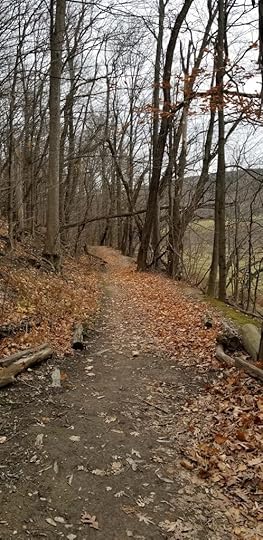
Suddenly the solitude didn’t feel so great. I wasn’t just alone, I felt alone.
And then it started. First with Julia. She snapped me: that makes 767 consecutive days we’ve exchange SnapChats. A few minutes later, Fred called, and I got to hear his exciting story about hunting a deer.
While I was on the phone with Fred, Owen called, and I switched over and talked to him for a long time. He’s into scented candles now. We talked about the differences between being bored and being lonely.
I had taken a photo of the preserve map when I’d started out and a good thing because I was so inside these conversations I needed to reference my location at every trail junction.
On my way down, Jim called. We talked about everything and did some laughing.
A group text went around among the Dads in town.
I don’t believe there was anything to it–all these favorite people reaching out to me with such exquisite timeing. I don’t believe in that cosmic-energy-connectedness stuff. I think I just got lucky today. And I happened to have my phone with me.
Then I went home and sat next to Harriet and we ate lunch together.
The post The Not So Lonely Path appeared first on by David Klein.
November 11, 2020
The Most Important Novels in My Life
I have set myself a task for 2020: reread the ten most important books in my life. To qualify for the list, the novel (or novella or short story collections; I’m including those also), must meet one or more of the following criteria:
It was so profound and meaningful to me that I’ve read the novel multiple times.It significantly influenced my own development as a novelist.The experience of reading the novel is inexorably linked to and illuminates a moment or period of time in my life.
It’s going to be challenging to pick the ten books. I’m not concerned that I’ve forgotten any important book, because if I have, then that book by definition wouldn’t qualify for the list. I’ve started with 25 titles, from which I must cull down to ten.
Why am I doing this? I’m interested in how the passage of time and accumulation of life experiences have changed how I feel about a book that I once placed on a high pedestal. Has the book stood the test of time? Have I? What’s changed?
For now, I’m listing my initial list of 25, in no particular order, and without explanation. When I get down to ten, I will provide context as to why I chose each one to read again.
UPDATE: I’ve re-read some on this list of 25 and updated their status below
UPDATE 2: I may not get the list narrowed to ten, but am offering reviews of those I have re-read.
THE WORLD ACCORDING TO GARP, John Irving . Prob won’t crack top ten. I think I liked THE CIDER HOUSE RULES and A PRAYER FOR OWEN MEANY better.AMERICAN PASTORAL, Philip RothSELF-HELP, Lorrie Moore A FARWELL TO ARMS , Ernest Hemingway. Feelings of nostalgia keep this novel on the list.A VISIT FROM THE GOON SQUAD, Jennifer EganTHE SLAP, Christos Tsiolkas THE EXORCIST , William Peter Blatty. Quite a read, but may not belong on the list.DUNE, Frank HerbertCAT’S EYE, Margaret Atwood THE UNBEARABLE LIGHTNESS OF BEING , Milan Kundera. Such an important novel back then. I still appreciate its influence on me. THE ROAD, Cormac McCarthyIN THE GARDEN OF NORTH AMERICAN MARTYRS, Tobia WolffLITTLE CHILDREN, Tom Perrotta SMILES ON WASHINGTON SQUARE, Raymond Federman . My introduction to experimental fiction. Belongs on this list.10:30 ON A SUMMER NIGHT, Marguerite Duras. Off the list, didn’t stand the test of time. Pretentious, obtuse, overwritten. THE CATCHER IN THE RYE, J.D. Salinger A PALE VIEW OF THE HILLS, Kazuo Ishiguro . As mysterious and haunting as ever. LOVE IN THE TIME OF CHOLERA, Gabriel Garcia Marquez . Likely top ten. It’s the writing, stupid. Many have imitated, but there’s only one GGM. BELLEFLEUR, Joyce Carol Oates THE HOURS, Michael Cunningham . Top ten. A pattern here: it’s the writing. And the structure. LEGENDS OF THE FALL, Jim Harrison . Specifically, the novella “The Man Who Gave Up His Name.” Grandfathered onto this list. THE THINGS THEY CARRIED , Tim O’Brien. Just an incredible and authentic work. Also: IN THE LAKE OF THE WOODS. MARIETTE IN ECSTASY, Ron Hansen . Likely top ten. The writing and language is incredible. The setting of the convent like another world. THE ACCOMPLICES, Georges Simenon . Certainly not a great novel, but it is a short, fascinating character study that made a strong impression on me.WHAT WE TALK ABOUT WHEN WE TALK ABOUT LOVE, Raymond Carver
The post The Most Important Novels in My Life appeared first on by David Klein.
I Honor My Father on Veteran’s Day
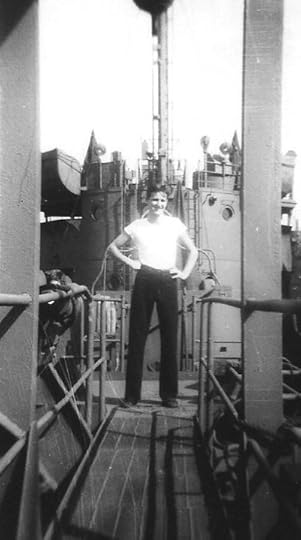
I honor my father today, Bob Klein, veteran of World War II.
At the too-young age of 17 he enlisted in the Navy and served in the Pacific. Here’s a photo of him, a long-legged sailor, on his ship. He came back from the war in one piece and lived a long and I believe mostly satisfying life.
He didn’t talk much about the war. I remember asking him if he was afraid of getting killed and he said he didn’t think about it much. Me? I don’t know how I would have handled such a situation.
But I did engage in some imagining and creativity in my novel, STILL LIFE, about an adult son reluctantly reconnecting with his father after years of estrangement (no such thing happened to me).
Here are a few short excerpts:
I’ve always known my father was brave. At age twenty he traveled by troop ship to the other side of the world. He crawled into man-eating jungles ripe with slaughter. He shot and got shot at. He slept in the mud with snakes while mortars reddened the tropical night. He bled among corpses, praying to join them or not.
As for being a hero, my father never wanted to be one, but I did, as a kid, although there was no war for me. And I wasn’t brave enough, anyway. I wanted the glory without getting my blood spilled. My war experience consists of watching movies and those black-and-white documentaries on television late at night, when everyone else is asleep. My favorite is a series called World at War. I learned all about the Normandy invasion, the Battle of the Bulge, Midway and Guadalcanal. There was an episode about the brilliant Nazi field marshal, Erwin Rommel, who was called the Desert Fox. Another one on Patton, a hard-nosed bastard, but effective. I saw lots of aerial shots from the bomb ports of B-52s, the jelly-bean bombs disappearing into a grid of factories, the silent puffs of smoke that followed. I watched ground shots of whistling artillery and soldiers running for their lives—or toward their deaths. I stared at the relentless grind of tanks, their treads mince-meating the landscape. I was mesmerized by the slow-pan aftermaths of burnt-out cities and smoking, sinking ships. I tried putting myself in those films, among the firepower and fleeing soldiers and black blood, but could not. I would have shivered with shell shock. I would have hid in holes. What can I have in common with my father—a man who earned combat stripes and a Purple Heart?
I have some favorite stories about war, soldiers, and veterans. One of the most powerful is Tim O’Brien’s On the Rainy River, included in his novel in stories “The Things They Carried.” There’s also Hemingway’s “A Farewell to Arms” on my list. And one of my favorite contemporary novels, “Billy Lynn’s Long Halftime Walk.”
I’m not a veteran. I don’t know if I would have made a good soldier in my youth. I think I’d do a much better job in the face of fire now.
One more passage from STILL LIFE . . .
He wasn’t one of those veterans who clammed up when asked about the war, averting his eyes inward where perhaps he had buried the human wreckage of it in a dark room in his soul. When my father spoke about the war he always talked about the landscape.
“We’d approach these islands and I could see white sand on the beaches and a turquoise sea,” he once told me. “Sometimes the sun was just coming up and the world was red. And the palm trees were tall and curved, reaching out of the jungle like welcoming arms—it was hard to believe there were snipers in those trees. Vinny, these views are what they take pictures of for postcards. The islands were a tropical paradise—until we landed on them.”
I asked him the question everyone wants to ask of those who’ve been to war: Did you ever kill anyone?
He hesitated before answering. “No, I don’t think so.”
I didn’t believe him. He’d been in combat for months.
I wanted to hear of hand-to-hand heroic battles, my father charging valiantly into the line of fire, wiping out an enemy battery, but he would have none of that talk. When I asked him to tell me how he got wounded, he said, “I was shot.”
He let me look at his scar, a tornadoed patch of flesh between his pelvic bone and spine. It didn’t look like a bullet hole; it wasn’t round at all. It was blotchy, like a broken egg, and mostly white, except one part that ridged and rippled and was red. It was gross, but I touched it, anyway. I think he wanted me to.
The post I Honor My Father on Veteran’s Day appeared first on by David Klein.
November 9, 2020
THE QUEEN’S GAMBIT
I love the opportunity to read a novel and see the film adaptation in a back to back sequence. This was the case with The Queen’s Gambit, which I thank Owen for bringing to my attention.

This novel, written in 1983 by Walter Tevis (The Hustler, The Man Who Fell to Earth), centers around Beth Harmon, a young female chess prodigy who is orphaned, discovers her talent at chess by playing the janitor in her orphanage, and goes on to become a champion.
You don’t need to play or even know anything about chess to become engrossed in the characters and the story.
The novel is a stunner, told through Beth’s point of view, and including a supporting cast of complex characters. While at the orphanage, Beth becomes addicted to tranquilizers which are given to all the children to keep them calm and obedient, and her addictions (alcohol comes in later) dog her through most of the novel, and are enabled by her adoption mother, a melancholic, sympathetic, and pitiable character.
Chess is a competitive and unexpectedly dramatic game played by obsessives who have few interests beyond chess. The novel is full of tension when Beth is competing in tournaments. Beth’s narrative arc—her goals, the forces of antagonism aligned against her, the story climax and ending—is classic, somewhat predictable, and yet totally satisfying.
How often do you love a novel and then are disappointed, even outraged, by the film adaptation? Many times it’s because of the impossibility of doing justice to the complexities of a novel in a 2-hour film, which is why the choice by Netflix to produce a 7-episode limited series of The Queen’s Gambit was such a brilliant move.
Seven hours of story—about the same time it might take to read the novel—allows for fully realized, complex, and contradictory characters. The adaptation is largely true to the novel, with a slight exception toward the end that isn’t a bad idea.
Anya Taylor-Joy shines in the challenging role of Beth Harmon. Marielle Heller as the woman who adopts the young Beth gives a nuanced performance. Even the janitor at the orphanage was complex. Chess—and how Beth sees the game—are visually compelling.
It doesn’t happen often: both the novel and the adaptation being award-worthy. I feel fortunate to have experienced them, one after the other. If it’s not too late for you, be sure to read the novel first.
Novel: 5/5 Stars
Series: 5/5 Stars
The post THE QUEEN’S GAMBIT appeared first on by David Klein.
November 2, 2020
Cheapskate, Environmentalist, or Minimalist?
I’ve developed an aversion to shopping, both online and in person. Because when you shop, you buy things, and I don’t want more things. I want fewer things. I want to get rid of stuff, not accumulate more.
Maybe I’m getting obsessive about it. Last year, I wondered if I actually owned enough clothing to see me through my remaining projected lifespan. Turns out, I don’t. You know those technical T-shirts that get so stinky and stay that way even after they’ve been washed? And wonder of wonders, underwear can rip, and socks get hole, and running shoes wear out. So I’ve had to replace some textiles.
Am I Just a Cheapskate?
I don’t think so. We give plenty of charitable donations each year in my family. I just get so little pleasure out of purchasing stuff. I know people who buy every damn thing that crosses their mind, but I don’t see they’re any happier for it.
During the early months of the pandemic, I took a course on “The Science of Well-Being.” One suggestion was to spend money on experiences rather than on things, because experiences are remembered, can last a lifetime, and will provide more pleasure.
I believe that’s true. I remember and still savor some art gallery visits where I paid an entrance fee. Or a special meal at a favorite restaurant. A trip to a spectacular national park. All experiences, with nothing concrete to show for them (okay, maybe a refrigerator magnet souvenir).
Reduce, Reuse, Recycle
We’re big into recycling at our home. We reuse plastic baggies. We make our own compost from kitchen scraps. You have to fill out an application in order to use a piece of aluminum foil.
Then there is the stuff I make. As the kids got older and our backyard ice rink days ended, I used the framing lumber to build a firewood crib. When I built a bookcase for Harriet to keep her cookbooks organized, I used only wood I had on hand. Same thing when I built my Little Free Library, which required a number of design compromises because I wouldn’t go out and by a damn hinge or a pine plank.
 Lumber from ice rink . . .
Lumber from ice rink . . .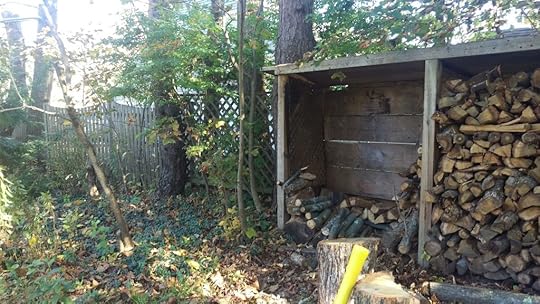 Becomes a firewood crib.
Becomes a firewood crib.Nonetheless, the wood crib still stands, the bookcase is straight, the library doesn’t leak.
I am an environmentalist, but I’m also a minimalist. I don’t need to possess more stuff. Buying things doesn’t make me happy. In fact, just the opposite: not buying things makes me happy.
With one exception: books. I buy books and I read them. Please don’t call me a hypocrite.
The post Cheapskate, Environmentalist, or Minimalist? appeared first on by David Klein.
October 30, 2020
My Ten Commandments for Social Media Use
The other day I did what I hate doing on social media: I experienced one of those knee-jerk, angry reactions to what someone posted and I kind of lashed out in the comments. That did nothing good for my state of mind.
I don’t use Facebook often and when I do I mostly lurk. But occasionally I share one of these blog posts on my Facebook page because I think there might be one or two people who might want to read what I wrote. When I do share a post, I end up spending more time on the site.
So I’ve decided to create a personal ten commandments in order to guide my social media behavior. Here they are:
Thou shalt post only what thou is willing the entire world to read.Thou shalt resist the temptation to immediately and impulsively refute someone’s words when thou disagrees with what they say.Thou shalt hurl no personal insults.Thou shalt not brag about thou offspring even though thou deeply loves and is exceptionally proud of them.Thou shalt not be guilted or goaded into reposting or sharing someone’s post about others who are trying to raise money, awareness, or empathy.Thou shalt not participate in divisive political discussions.Thou shalt not use a snarky or dismissive tone.Thou shalt not complain.Thou shalt follow the Golden Rule.Thou shalt not use social media much if thou sticks to these rules, because with so many rules to follow, what’s left to post?
The post My Ten Commandments for Social Media Use appeared first on by David Klein.
October 26, 2020
Solitude
Julia and I had a conversation about solitude. I was telling her I went bow hunting over the weekend, and although I was with friends, I spent many hours alone in a tree stand, apart from the others.
She wondered if that was difficult for me—all that solitude. She says she can struggle in those moments because her thoughts can turn negative and get the better of her. I’m with her on that one: the darkness can happen. So can the light.
 Sunrise from the solitude of my tree stand.
Sunrise from the solitude of my tree stand.But I still find solitude essential. I sent her this photo of the sunrise from my tree stand and said “Solitude is one of life’s intense experiences, and yet seemingly nothing is happening.”
She sent me back this quote from Pulp, by Charles Bukowski:
“Often the best parts of life were when you weren’t doing anything at all, just mulling it over, chewing on it. I mean to say that you figure that everything is senseless, then it can’t be quite senseless because you are aware that it is senseless and your awareness of senselessness almost gives it sense. You know what I mean? An optimistic pessimism.”
That’s so out there it makes sense!
The solitude of deer hunting is a real test of your interior mettle. You’re supposed to be doing things and not doing things: paying attention to your surroundings, scanning for movement, listening for sounds, focusing on your purpose; and at the same time not moving, not making any sounds, not being bothered by the cramp in your back.
You also have your thoughts to contend with—and this is where solitude can get challenging. Because your thoughts can go wandering, and sometimes they slip down the dark hole. The negative self-perception. The stupid things you said. The mistakes you made. The loneliness, the loss, the lamenting.
 Pondering while paying attention, or not.
Pondering while paying attention, or not. At other times you can use solitude to your advantage. As a writer, solitude is the primary source of my creativity. I can mull over ideas. I can let my imagination imagine. Solitude offers anyone an opportunity to plan without distractions, or to set the record straight on yourself, or to simply absorb the moment.
And yet solitude gets a bad rap. Study after study demonstrates that the key to satisfaction and health in life is social relationships. This is probably true, but solitude, and even times of loneliness, are just as important to living a full life.
Again, Bukowski, this time from Factotum:
“I was a man who thrived on solitude; without it I was like another man without food or water. Each day without solitude weakened me. I took no pride in my solitude; but I was dependent on it. The darkness of the room was like sunlight to me.”
I didn’t get a deer while hunting, but I experienced the beauty of nature and some sublime moments of solitude—as well as some difficult ones. I got a good temperature check on myself. It’s something we all need.
The post Solitude appeared first on by David Klein.
October 22, 2020
Fly Your Flag
Most of my interest in flags has concerned the U.S. flag. I’ve flown it upside down and right-side-up, and after the election I’ll be flying it one way or the other depending on the results.
The U.S. flag is such a powerful symbol, but I don’t “Pledge allegiance to the flag of the United States of America, and to the Republic for which it stands, one nation, under God, with liberty and justice for all.”
I had to repeat that damn pledge every day in elementary school, hand over heart, standing at attention, facing Old Glory.
My issues: We are not one nation, we are a divided nation. We should not say “under God” because state and church should be completely separate. And “liberty and justice for all?” Take a look around–that ain’t happening.
I’m a little embarrassed by our flag these days because I’m embarrassed about our country. And I hate that too often the flag is associated with Republicans. Maybe what’s needed is a flag we can each proudly call our own, one that symbolizes our individual identity. Not practical, right?
Then I came across this:

Who knew there were so many flags related to gender and sexual identity? I had to look some of these up. For example, pansexual vs. polysexual: “The prefix ‘pan’ means ‘all’, as in ‘pansexuals are attracted to all genders’. The prefix ‘poly’ means ‘multiple’ or ‘many’, as in ‘polysexuals are attracted to multiple genders’, though not necessarily all. And a demisexual person only feels sexually attracted to someone once they’ve made a strong emotional connection.
I’m glad these flags exist. These groups should be represented. They should have their own symbols.
So now I’m thinking of designing a flag that’s just for me. White, male, heterosexual, pushing the upper limits of middle age, writer, father, husband, brother . . .
Any designers out there want to take a crack at it?
The post Fly Your Flag appeared first on by David Klein.
October 19, 2020
CULTS: The Girls, a novel, and Martha Marcy May Marlene, a film
Sometimes I do a two-for-one, packaging a thematically-linked novel and film review, such as the novel The Revenant and the film 1917.
Today’s theme is cults, which I’ve become interested in recently, although I have no interest in joining or starting one. The two works of art: The Girls, by Emma Cline (2016), and Martha Marcy May Marlene, written and directed by Sean Durkin (2011).
Apparently, various cults share a lot of common attributes. Invariably there is a charismatic male leader (at least we’re supposed to believe he’s charismatic) who plays guitar poorly and has on-demand sex with a brainwashed follower of his choosing. There is usually a run-down ranch, awful food scarce in quantity, shared clothing and beds, a few toddlers in the background. Members dumpster-dive, steal, and commit other crimes. The cult members have been love-starved or otherwise emotionally damaged—why else would they join a cult?
Both this novel and this movie share all of these attributes. Let’s start with The Girls. The novel is told from the viewpoint of an adult woman looking back on her experience as a 14-year-old (14!) who got involved in a Charles Manson-like cult after being mesmerized by the sight of several young women in a park who were mentors.

Cline’s writing is beautiful, so beautiful it sometimes take precedence over storytelling, which results in toning down the tension. Also, because the reader already knows that Evie, the narrator, survives the cult experience and goes on to lead a somewhat normal existence, we know she wasn’t the one involved in the murders (no spoiler; it’s a lot like the Manson narrative).
The novel is set in the present time, when Evie is housesitting for a friend, and flashes back to her teen years when she was drawn into the cult. Young Evie’s transformation, her dissatisfying home life with her mother, the way she is enthralled by and taken in by the young cult member Suzanne, her naivety and her desire to belong and to be loved—these are the strongest parts of the novel and they make for excellent reading.
Not so compelling, but nonetheless well-written, is her present-day narrative, when the young adult son of the friend she is housesitting for shows up with his girlfriend, a nervous and vulnerable teen that conjures a parallel to the young Evie. They know about Evie’s previous life all those years ago, and their inquisitiveness sparks a number of the flashbacks.
The novel reaches climax on the night of the murders, which Evie is spared being involved in, which again lessens the stakes, as does the fact the murdered people were not really characters in the book, so other than the gruesomeness, it’s hard to feel for them.
Overall, The Girls is an easy and fascinating read, a remarkable first novel from a young and extremely talented writer.
Martha Marcy Marlene May features an outstanding performance by Elizabeth Olsen in the title role. Her name is Martha, but the cult leader (Patrick, played by John Hawkes), renames her Marcy May, and all the women at the cult answer the phone at the compound saying their name is Marlene.
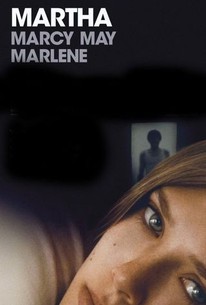
The film opens with the usual cult depictions—communal sleeping and clothes and chores and poverty and Mr. Charisma—followed by Martha packing a bag and escaping through the woods. She ends up in town where she calls the sister she is estranged from, but she is so emotionally distraught that her sister comes to get her.
She stays with her sister and her husband at their huge home on a lake in Connecticut, and so begins Martha’s flashbacks to her cult experience, including drug-induced rape, mind-numbing chores, shooting guns, breaking into houses, and eventually a murder. Familiar. Yet stunning.
Martha is unable to integrate back into life. She strips down to swim in the lake, only to be yelled at by her sister. She hears her sister and her husband having sex in the next room, and goes in there and lies next to them on the bed. As the film progresses, Martha begins having delusions: she thinks the bartender at a party is a cult member. She sees a member of the cult sitting on a boulder across the lake. When her sister finally is taking her to receive psychiatric help, she thinks they’re being followed.
Is Martha really being pursued by the cult, or is she suffering a mental breakdown? You can interpret the events either way, which is what makes the film so powerful, along with Elizabeth Olsen’s performance. Top-notch storytelling.
A parting thought on cult leaders: I don’t see the charisma. Dirty men in dirty clothes speaking in calm platitudes and playing guitar badly. Women flock to this? And then I realize it’s not the leader who is so mesmerizing and powerful, it’s the women who are so lost and vulnerable.
The post CULTS: The Girls, a novel, and Martha Marcy May Marlene, a film appeared first on by David Klein.
October 18, 2020
No Satisfaction–Yet
I was out inspecting the perimeter yesterday and I saw a flash of red in the bushes. I pulled out this sign that someone must have tossed here.
They probably stole it from another lawn and flung it here, hopefully in disgust, but I wish they hadn’t tainted my property. It landed not far from my Black Lives Matter sign.
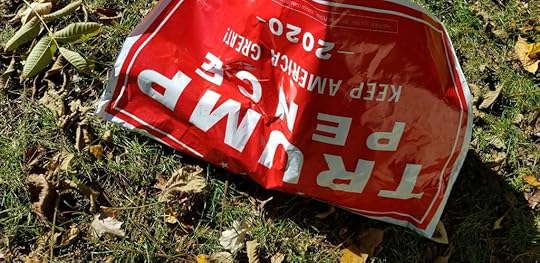
The Trump sign was high quality: heavy plastic and sturdy wire frame. It wasn’t that easy bending the spokes and ripping the plastic. But I managed. I worked hard. No satisfaction in it, though. None at all.
Only one thing will give me satisfaction, and that can’t happen until November 3.
The post No Satisfaction–Yet appeared first on by David Klein.



